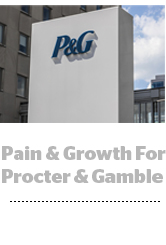 Procter & Gamble isn’t done trimming its agency and advertising investments, even after a year of deep cuts to media and production budgets, according to senior managers during the company’s Q2 earnings report on Tuesday.
Procter & Gamble isn’t done trimming its agency and advertising investments, even after a year of deep cuts to media and production budgets, according to senior managers during the company’s Q2 earnings report on Tuesday.
Digital media and tech vendors have become more transparent since P&G began crusading against online supply chain failures a year ago, said CFO Jon Moeller. And with this transparency, “it’s clearer and clearer to us that there are additional ways to eliminate waste.”
P&G cut hundreds of millions of dollars in digital advertising last year, but online fraud, nonviewable inventory, bot traffic and overtargeting individuals due to the inability to frequency cap across channels leave room for further reduction, Moeller said.
Even with P&G’s digital ad pullback last year, improved targeting and media relationships helped the world’s biggest ad spender reach 10% more people in 2017 than it did the previous year.
“Looking ahead, we see further price reduction opportunities with private marketplace deals directly with media companies and media buying fueled by data and digital technology,” Moeller said.
Much of the savings from PMP deals and ad tech were because P&G is in-housing those capabilities and drastically reducing agency outlays.
P&G trimmed its global agency roster last year from 6,000 to 2,500, and expects to cut about half of the remaining agencies in 2018, Moeller said. The cuts translated to $750 million savings in agency fees and production costs in 2017, likely growing to more than $1 billion in agency reductions by the end of this year.
“We need the contribution of creative talent and are prepared to pay for that,” he said. But content production and media-buying margins will be further compressed as P&G in-houses more of the marketing stack.
P&G didn’t comment on changes to its board in Q4, after activist investor Nelson Peltz claimed a director seat in the wake of a contentious shareholder vote. Peltz had petitioned P&G investors to support his bid based in part on opposition to the company’s marketing strategy and its failure to preempt ecommerce-first CPG startups from claiming market share.
This post was syndicated from Ad Exchanger.

More Stories
AppLovin is Officially the New Target of Short Sellers
Is Tegna Looking to Hub Weather in Its Local Markets?
Stuff Group taps Belinda Francis to lead North Island Markets